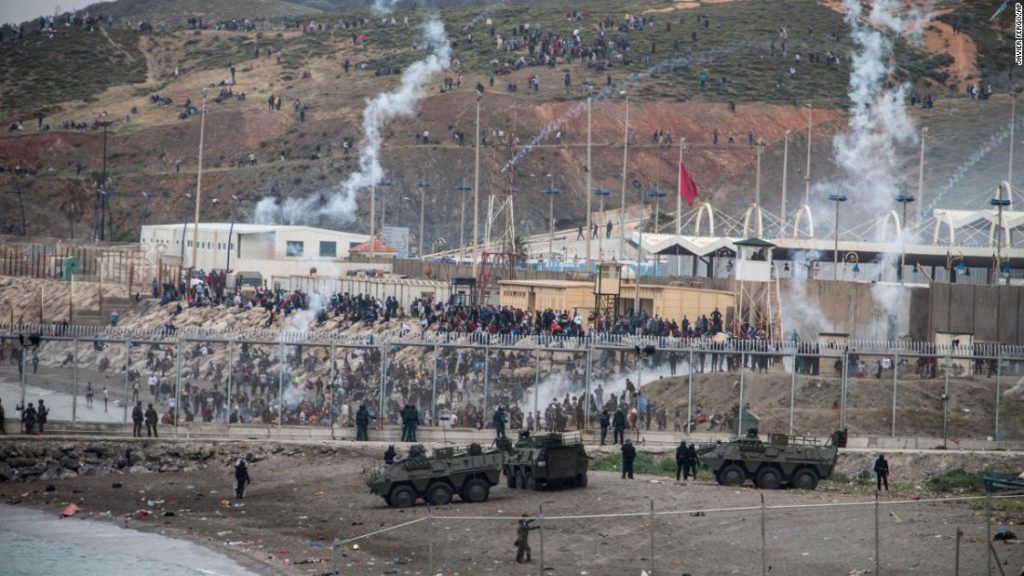The migrants swam from two locations, with some entering southern Ceuta at Tarajal beach, and a larger group entering the north of the city at Benzu beach, a spokesman for the Spanish government in Ceuta told CNN.
One man drowned in the process, the spokesman added.
At both locations, migrants swam around rocky breakwaters jutting out into the Mediterranean that mark the border between the countries. The spokesman said it was a short distance in each case.
Ceuta is an enclave of some 84,000 Spaniards on Morocco’s north coast and, crucially for migrants attempting to enter, it is on European Union soil.
“I have never seen a situation like this one, it is unprecedented, I have never felt so frustrated and sad,” Ceuta President Juan Jesus Vivas, told Spanish broadcaster TVE on Tuesday.
“This is a chaotic situation, so chaotic that we can’t tell the exact number of migrants at the moment,” he added. “We need to gather all the ones who have arrived and allocate them in a specific location, so they are not just wondering around the border.”
The Red Cross has been assisting migrants with dry clothes, blankets and food at Tarajal beach. The charity’s spokeswoman, Isabel Brasero, told Spanish TVE that the migrants included babies, and so far all who made the journey around the breakwater appear to be in good health.
She added that the migrants were probably helped by favorable weather and the short distance they swam.
Border flashpoint
Spanish Prime Minister Pedro Sanchez said Tuesday he would travel to both of his country’s enclaves on Morocco’s north coast: Ceuta and the city of Melilla, which lies further east.
Sanchez promised to “reinstate the order,” and said Spain will return “immediately” all those who entered illegally, as allowed, he added, by existing agreements between Spain and Morocco.
Indeed, around 2,700 people have already been returned to Morocco, Spain’s Interior Minister, Fernando Grande-Marlaska, told Spanish TV on Tuesday.
Spain’s Interior Ministry said in a statement that it is reinforcing the police contingent in Ceuta. It added that Spain and Morocco recently agreed that Moroccans who swim into Spain face a return to Morocco through one of the land border crossings.
The land border of several miles between Ceuta and Morocco has a tall fence. It is a flashpoint for the migration of sub-Saharan Africans trying to enter Spain, and the European Union, in groups.
Ylva Johansson, European Union Commissioner for Home Affairs, wrote on Twitter that it was “worrying” that so many people, a large number of them children, were endangering their lives by swimming to Ceuta.
“The most important thing now is that Morocco continues to commit to prevent irregular departures and that those that do not have the right to stay are orderly and effectively returned,” she added.
Spain has seen an increase in migrants arriving on its shores in recent months.
Frontex, the European Border and Coast Guard Agency, says that “more than 1,000 irregular migrants reached the Canary Islands in April, three times the total from the same month of last year.
“In the January-April period, nearly 4,500 irregular migrants arrived on the Canary Islands, more than double the total from the same period of 2020. Nationals from sub-Saharan countries, most claiming to be from Mali and Morocco, accounted for the largest number of arrivals.”
CNN’s Arnaud Siad, Vasco Cotovio, Claudia Rebaza, Isa Soares, Stephanie Halasz and Sheena McKenzie contributed to this report.
You may also like
-
Afghanistan: Civilian casualties hit record high amid US withdrawal, UN says
-
How Taiwan is trying to defend against a cyber ‘World War III’
-
Pandemic travel news this week: Quarantine escapes and airplane disguises
-
Why would anyone trust Brexit Britain again?
-
Black fungus: A second crisis is killing survivors of India’s worst Covid wave

